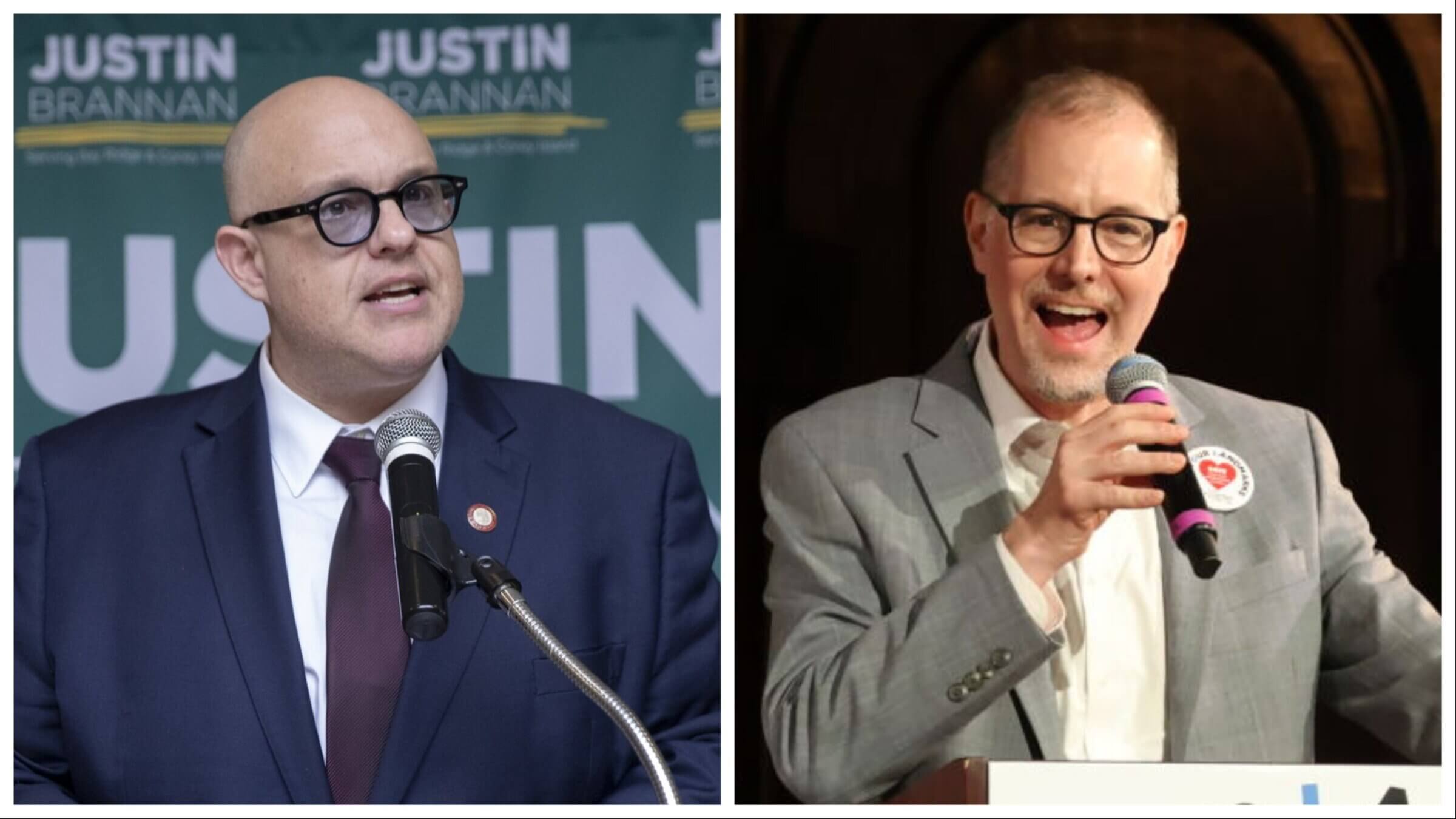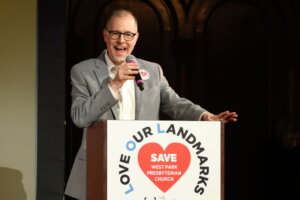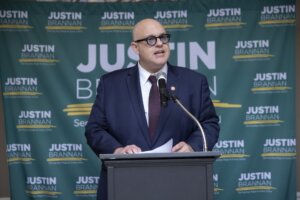Why Jewish voters in New York should care about the comptroller race
Mark Levine highlights heritage and allyship, while Justin Brannan leans on aid track record as both vie to become NYC’s chief financial watchdog

(L to R): Justin Brannan and Mark Levine, candidates for New York City comptroller. Photo by Justin Brannan / Rob Kim/Getty Images
Jews and New York politics have rarely seemed so much in the mix, with multiple mayoral candidates making antisemitism and Israel priority issues.
Among the Orthodox, there’s also intense interest in a down ballot race in next week’s Democratic primary, for the comptroller nod.
The comptroller is the city’s chief fiscal officer, responsible for auditing agencies and nonprofits, approving contracts, managing pension funds, and shaping how billions of dollars are spent.
The two leading candidates, Manhattan Borough President Mark Levine and Brooklyn Councilmember Justin Brannan, are aggressively seeking the rabbinic endorsements seen as key to getting the Haredi vote.
Recent polls show Levine, who is Jewish, in the lead, but 44% of voters remain undecided. A Honan Strategy Group poll of 412 likely Jewish voters conducted May 15 through May 18 and shared with the Forward, showed Levine ahead of Brannan 40%-14%, but 45% were still undecided.
Each brings a distinct appeal in making the case to Jewish voters.
Brannan represents a large Palestinian-American constituency in Bay Ridge and a sizable Orthodox population in the southern Brooklyn district. As chair of the council’s powerful finance committee, he has built strong ties with Orthodox leaders by supporting nonprofits that serve families in need and expanding social services.
Levine, who represents Manhattan’s Jewish communities, speaks frequently about his connection to Jewish life and support for Israel. If elected and if no Jewish mayoral candidate breaks through, he could become the highest-ranking Jewish elected official in the city. That would continue a line that includes outgoing Comptroller Brad Lander and his predecessor Scott Stringer. Lander and Stringer are both running for mayor in next week’s primary.
Lander was arrested by immigration agents on Tuesday while escorting a defendant out of immigration court.
The comptroller candidates have stayed neutral in the mayoral race, but their chances may depend on who wins the top slot.
If Brannan wins, it could be thanks to the endorsement he secured from Zohran Mamdani, the insurgent Democratic Socialist whose unapologetic criticism of Israel has unsettled many Jewish voters. Brannan hasn’t officially endorsed Mamdani’s mayoral bid in return, but he fueled Mamdani’s momentum by leaking an internal poll showing him overtaking former Gov. Andrew Cuomo.
Sen. Bernie Sanders, the Jewish Vermont independent who helped mainstream socialism through his presidential campaigns, endorsed Brannan on Tuesday, along with Mamdani.
Whether Cuomo wins or Mamdani pulls an upset, Jewish leaders see the comptroller’s office as a critical check on City Hall’s financial priorities.
The city’s chief accountability officer and watchdog can push for expedited payments to nonprofits, funding that many Jewish organizations rely on.
The office also oversees pension fund investments in bonds. In recent interviews, both Levine and Brannan pledged to increase investments in Israeli bonds. Many Jewish voters view the bonds as bulwark against the Boycott, Divestment, and Sanctions movement.
Who is Mark Levine?

Mark Levine, 52, was born in Chicago and raised in Columbia, Maryland. He represented northern Manhattan’s 7th Council District since 2014 and served as chair of the Jewish Caucus.
In his two campaigns for the council, Levine was subject to vitriolic antisemitic attacks from a primary rival. In office, he helped establish the Office for the Prevention of Hate Crimes in 2019, introduced increased funding for Holocaust survivors and secured funding for security at religious sites and schools.
Levine’s advocacy when he was health committee chair during the COVID-19 pandemic, earned him the nickname “the Anthony Fauci of the New York City Council.” In the 2024 presidential race, he led a canvassing effort in key swing states.
Since his election as Manhattan Borough President in 2021, Levine has used the mostly ceremonial role to elevate Jewish issues and speak out against rising antisemitism.
Levine and his wife, Ivelisse Suárez, have two children, Alejandro and Daniel. He speaks fluent Spanish and Hebrew, both of which he used in TV ads in the current race. He is a member of Hebrew Tabernacle Congregation, a Reform synagogue in Washington Heights and often speaks in Hebrew at Israel-related gatherings.
“It would be enormously meaningful,” Levine said in an interview, about the prospect of becoming the city’s highest ranking Jewish official. “I don’t want to overly obsess about identity, because we have great non-Jewish allies, but it’s important,” he said. “I would feel a sense of responsibility to represent the Jewish community well, and my success or failure will, in part, reflect on the community.”
Who is Justin Brannan?

Brannan, 46, is a two-term Councilmember from Brooklyn, representing the Bay Ridge, Dyker Heights and Bensonhurst neighborhoods. In the 2017 Democratic primary, he defeated Khader El-Yateem, a Palestinian Lutheran minister backed by Israel boycott activists. Mamdani began his political involvement as a volunteer for the El-Yateem campaign.
Brannan has for four years chaired the legislature’s finance committee.
Brannan is aligned with the progressive left. In the current race, he’s backed by the Working Families Party, the Sunrise movement and politicians affiliated with the Democratic Socialists of America. Controversial figures accused of antisemitism have contributed to his campaign. He endorsed Kayla Santosuosso, who supported BDS in now-deleted social media posts, as his successor.
Brannan himself strongly opposes BDS. “I just don’t agree with that strategy,” he said in an interview, mentioning that he has close family in Israel. After Oct. 7, Brannan called for a humanitarian ceasefire in Gaza and the “unconditional immediate release of all hostages.”
He said his focus was on bringing people together and seeking peace, and delivering the same message wherever he was.
“I’m the type of person who will give the same speech in a mosque, synagogue or a church,” he said. ”I have the same message for everyone, and it’s always been a message of peace and non-violence and trying to bring down the temperature while also empathizing with the real fear and anxiety that people have here at home — with the rise of hate crimes — and that people are deathly afraid of what’s going on with their families back home.”
Jewish support

Every Orthodox voting bloc has endorsed Cuomo as their top mayoral pick, which is unprecedented in a primary. The groups are split between Levine and Brannan in their ranked-choice slate for first place.
Despite his underdog status, Brannan earned the backing of the larger Satmar faction and a coalition of Hasidic voting blocs in Williamsburg, as well as the State Senator Sam Sutton, who was the longtime head of the Sephardic Community Federation in Brooklyn before he was elected to the state legislature in a special election last month Brannan’s Orthodox supporters have mostly highlighted his work on funding and poverty issues.
The candidates have avoided direct public clashes over Israel outside of a brief debate exchange on Israeli bond investments. A behind-the-scenes battle over pro-Israel credentials and mutual accusations over associations with far-left individuals has unfolded quietly. According to two Orthodox leaders who attended private meetings, both camps have accused the other of making misleading claims about their bona fides.
“I want the suffering to end, I want the violence to end,” Brannan said about his views on the Israel-Gaza conflict. “I want humanity to prevail. I don’t change because of the wind and because of the news.”
Former Rep. Max Rose, a Democrat who represented Brannan’s district, said claims that Brannan is insufficiently supportive of Israel are “unfounded.” He noted his own focus on Israel and antisemitism during his time in Congress from 2019 to 2021.
Rose, who is Jewish, said Israel isn’t an issue in the race because the candidates’ views are “equal.” Diane Sokol, the former president of the Bay Ridge Jewish Center, who endorsed Brannan, said he has “shown up for the Jewish community not just when the cameras are on or in moments of crisis.”
Levine said he feels his campaign is resonating with Jewish voters who have an emotional attachment to Israel. “I think it’s important that they see leaders who share that,” he said.
Correction note: The Sephardic Community Federation hasn’t endorsed in the race for comptroller. Its president, Sam Sutton, endorsed in his capacity as an elected official.















